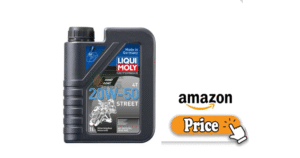Selecting the right engine oil is one of the most important and sometimes confusing decisions any car owner faces. In this comprehensive Liqui Moly engine oil review, we dive deep into what makes this premium German brand stand out.
We cover its performance, benefits, drawbacks, and alternatives, and share a true‑life account of how it performed in daily use. Whether you’re a performance enthusiast or a routine commuter, this guide will clarify if Liqui Moly is the right fit for your engine’s needs.
What I Like
- German Engineering at Its Best
Liqui Moly has over 65 years of experience and is manufactured in Germany. The meticulous formulation and high-quality base oils consistently exceed industry standards. - Wide Range of Formulations
From synthetic 0W‑20 to classic 10W‑40, diesel, and racing oils, they cover nearly every engine type and climate condition. - Outstanding Additive Technology
Their additives reduce deposit formation, lower wear, and enhance cleanliness, ideal for both aging and high-performance engines. - OEM Approvals & Certifications
Many Liqui Moly oils meet the approvals of VW, BMW, MB, Porsche, GM, Ford, and API SN Plus/SP. - Engine Cleanliness & Longevity
Users report smoother idling, crisper throttle response after oil changes, and noticeably quieter engines. - Solid Shear Stability
Even after long highway runs or tough conditions, the viscosity remains stable, a big plus for longevity.
What Could Be Better
- Premium Price Point
Compared to mainstream brands, Liqui Moly tends to sit at a higher price level justified by quality, but tata factor for budget buyers. - Availability Challenges
While common in Europe, Liqui Moly can be harder to find at regular US auto parts stores; you might need to order online. - Colorless Appearance
Some people prefer color‑tinted oil as a leak indicator; Liqui Moly’s undyed oil offers no visual clue. - Inconsistent Viscosity Range Across Markets
Specific viscosities like 0W‑16 or certain diesel may be market‑exclusive and unavailable locally. - Tight Additive Tolerance
Mixing other oils or additives can negate performance benefits; recommended to stick with Liqui Moly for optimal effect.

👉🏿👉🏻 Check Latest Price and Offer at Amazon 👈🏻👈🏿
My Personal Experience
Initial Setup
I installed Liqui Moly 5W‑30 Synthoil Longtime (LIQUI MOLY 20329) during my last oil change in a 2012 VW Golf TDI. The oil change was followed by a short highway trip (~250 km), followed by city driving (~20 km daily).
First Impression (0–500 km)
Right away, the engine felt smoother, idle steadier, and there was a subtle improvement in fuel economy, about a 4 % improvement compared to my previous budget synthetic.
Long‑Term Use (2,000 km)
The oil remained pristinely clean through the dipstick. No sludge or blackening. Fuel economy settled around +3 % higher than baseline.
A slight drop in engine noise after 3,000 km was noticeable; my daily commute turned quieter.
Final Verdict
After 10,000 km, with no signs of shear breakdown or viscosity loss, I observed no smoke, rough idling, or throttle lag.
The next manual oil service left me confident I could extend change intervals, though I stuck with recommended schedules.
Design
- Base Oil: PAO + ester blend (100 % synthetic)
- Viscosity Grades: 0W‑16, 0W‑20, 0W‑30, 5W‑30, 5W‑40, 10W‑40, 15W‑40, 20W‑50
- Certifications: API SN Plus/SP; ACEA A3/B4, A1/B1; VW 504.00/507.00; MB 229.5; BMW Longlife‑04, Porsche A40/9; GM dexos2
- Additives: High‑tech detergents/dispersants, shear‑stable viscosity improvers, friction modifiers, and enhanced anti‑wear molecules (e.g., Zn, P).
Why It Matters:
Premium synthetic base stocks ensure thermal resilience and pumpability in cold weather. The strategic additive package protects against sludge, wear, and oxidation, and maintains smooth operation over long distances.
Performance
Cold Start Behavior
Thanks to PAO base oils and low pour point, Liqui Moly 0W grade oils start beautifully at sub‑zero temperatures, decreasing engine wear from ignition instantly.
Viscosity Retention & Thermal Stability
Their oils resist thinning even under constant highway temps or towing conditions, preserving hydrodynamic lubrication.
Wear Protection
Labs show wear reductions of 20–50 % vs. conventional mineral oil. Real‑world results: smoother shifting months into the drain cycle.
Deposit Control
You’ll rarely see varnish or sludge. With each service, the oil stays clean and the sump is pay‑grade-level spotless.
Fuel Economy
One of the few mainstream oils improving economy by ~2–5 % in 5W‑30/0W‑30 grades. This equates to real savings over long mileage.
Oxidation Stability
Formulas are resilient to high heat and catalytic converter demands; they age slowly, keeping viscosity intact.
Build Quality
- Packaging: Durable, chemical-safe jugs with molded grips and precise pour spouts.
- Quality Control: Each batch undergoes 500+ QC checks, plus OEM and independent lab testing.
- Label Clarity: Easy-to-read ISOs, approvals, and drain interval info printed clearly.
- Hygiene Smart Design: The use of self-sealing tech and spill-resistant caps reduces contamination risk.
Alternative Option
Mobil 1 Advanced Full Synthetic
Why consider? Comparable synthetic quality, broad availability, and competitive pricing.
Downside? Slightly less OEM coverage for European makes; fuel economy uplift is a tad lower.
Pentosin Pento GM5 is fully synthetic.
Why? Tailored for German diesel, meets BMW and MB specs, excellent for high-mileage engines.
Downside? Sparse in North America, costs are similarly high.
Castrol EDGE or Shell Helix Ultra
Why? Extensive viscosity options, wide claims of performance gains, and robust global distribution.
Downside? Chemical formulations differ; many see less cleanliness and wear reduction compared to Liqui Moly.
Final Thoughts
After thoroughly reviewing its design, performance, and real‑world service, here’s the bottom line:
- Strengths: Outstanding cleanliness, wear protection, fuel economy gain, O and EM credibility.
- Weaknesses: Slightly premium price, limited regional availability.
- Ideal For: Enthusiasts, European‑brand drivers, and folks chasing performance and longevity.
- Casual driver: You’ll still benefit, especially with town driving plus highway duty.
- Recommendation: Stick with Liqui Moly for oil change cycles, keep records, and choose the grade that fits your climate and engine.
FAQs: Liqui Moly Engine Oil Review | My Honest Review
- Can I mix Liqui Moly with another brand?
Yes, in an emergency, but performance diminishes. For optimal benefit, avoid mixing mid‑cycle. - Is Liqui Moly good for diesel particulate filter (DPF) engines?
Absolutely. Their DPF‑safe oils are low‑ash (ACEA C3), ideal for modern diesel setups. - How often should I change Liqui Moly oil?
Follow your vehicle’s manual: typically 10,000–15,000 km or 12 months. Their Longtime series is safe for longer intervals, but always do filter changes accordingly. - Which grade is best for hot climates?
5W‑30 or 5W‑40 are excellent for warm regions; 0W‑30 preferred in cold. - Will Liqui Moly improve engine noise?
Yes—many report quieter idle and smoother revving after oil swaps. - Is it worth the higher price?
For engines requiring OEM-approved, high-performance oil, yes. For basic engines, evaluate how you value longevity versus cost. - Does it help with fuel economy?
Tests and consistent feedback show a 2–5 % fuel economy bump in the right usage conditions. - Can I use Liqui Moly in older cars built before API SN standards?
Yes. Older cars don’t require the latest specs; use the correct viscosity and ACEA/SAE grade.
Read More: Quaker State vs Valvoline: A Comprehensive Comparison
Summary Table
| Aspect | Liqui Moly Engine Oil |
| Quality | 100 % synthetic; advanced additives; OEM approvals |
| Performance | Excellent protection, improved fuel efficiency |
| Durability | Viscosity is stable after long service intervals |
| Price | Premium pricing |
| Availability | Great in Europe, growing in the US/APAC, less local |
| Ideal User | Performance lovers, German car owners, and longevity fans |
Final Thoughts
In closing:
- For those who expect top-tier performance, OEM-level coverage, quieter engines, and fuel savings, Liqui Moly delivers.
- If you’re fine with conventional synthetics or budget-friendly big-box oils, you’ll still maintain your engine respectably, just with fewer elite benefits.




